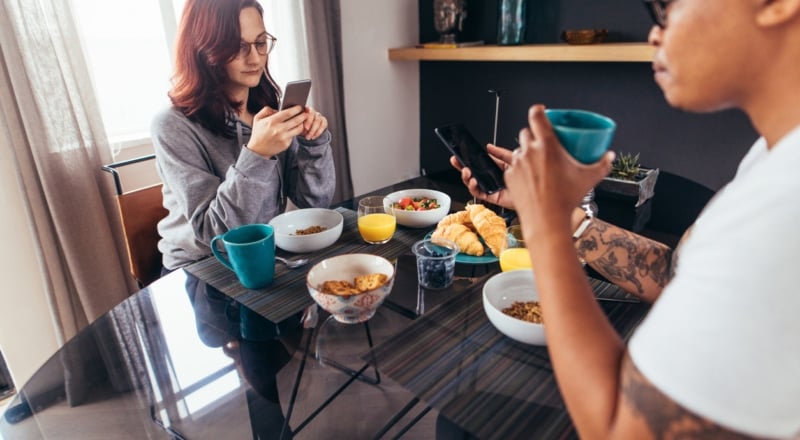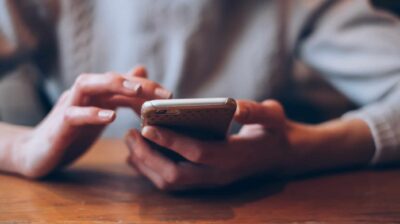Is it time for a digital detox?
Could the way you use your phone be impacting on the way you feel?

It is difficult not to be constantly plugged into technology these days. For most people, your phone is the first thing you look at when you wake up, the last thing you look at before you go to sleep, and where most of your attention goes during the day too.
While technology can have huge benefits in allowing us to access information, connect to other people, and find entertainment, it can be a good idea to step back every once in a while and look at our relationship to our phones and other devices.
Is technology bad for your mental health?
A lot of people have concerns that the time spent on phones and computers is having a negative impact not only on our physical health, but on our mental health too.
While using technology generally doesn’t lead to mental health problems, the services we access on our phones and computers, like social media, can have an impact.
Some of the ways that social media can have an impact on your mental health include:
- Lower self esteem because you compare yourself and your life to others online
- Your self esteem relies on how much attention your social media posts are getting
- Developing a negative or worsening body image because of content on social media
- Poor sleep quality because of time spent online at night
- Experiencing cyberbullying online
- Fear of missing out (FOMO) when you see what other people are doing online, which can also lead to feelings of loneliness or inadequacy
- Less time spent connected offline with friends and family and less time doing activities you enjoy
However, there are lots of benefits to social media too, including making connections with others and finding communities of like minded people who share your interests.
Read more about how to stop social media affecting your self esteem.
Understanding your relationship to technology
If you want to reduce screen time or take a few days away, it helps to start off by understanding the way you use your phone at the moment. Across all ages in Ireland, the average person checks their phone 57 times a day – knowing your own habits can be a real eye opener into how dependent you are on technology.
Track your usage
Download an app or take a look at your settings to track the way you’re using your phone. A tracker app can tell you how many times you unlocked your screen, what apps you use the most, and how many hours you spent on your phone overall. You might be surprised at the results, and it can help you to work out which apps you need to cut down on the most.
Ask someone to watch you
If you’re spending time with someone, ask them to say something every time you pick up your phone. Often we don’t realise what we’re doing when we start scrolling through social media, but the people we’re with usually notice when our attention is on our phone. This can be a good way to catch yourself in the moment and really notice how often it’s happening.
How to do a digital detox
If you feel your phone use is impacting negatively on your life in some way, a good first step is to try a digital detox. It doesn’t have to be a big change; you can start small. First decide when you’re going to do your digital detox, and then decide how long you want it to last. The length of time is really up to you, but try and make it long enough to really feel a difference.
Decide what to cut out
Doing a digital detox doesn’t necessarily mean you cut yourself off from technology entirely. Decide what parts of your online habits you think are problematic or need to change, and pick a detox that helps address that concern. For example, if you’re worried about how often you’re checking social media before you go to sleep and when you get up in the morning, then commit to only checking your phone for one or two hours in the middle of the day, or at lunchtime. Before you do, let people know when you won’t be available on those apps, but tell them how they can contact you if they need to. That way you can’t make excuses for checking in during your break.
Install apps that monitor your usage
If deleting apps from your phone feels a step too far, then you can download apps that monitor your usage and stop you from accessing certain apps. For example, if you want to stay off Instagram for a week, the app will show a message telling you this app is blocked whenever you try to open Instagram. It can be easy to slip up or forget, so these apps can keep us in line.
Apple and Android devices now also have screen time settings that can help you to monitor your usage.
Find other things to do
Find other ways to fill your time when you’re trying to stay off your phone or computer so that you won’t be tempted to pick it up again. Try and do an activity that requires attention so that you’re less likely to be distracted, and consider removing your phone or laptop from the room while you’re doing it. If you have a tendency to look at your phone when you’re watching TV, for example, then try and think of something else to do with your hands so that you can stay focused on that instead.
Notice how you feel
If doing a digital detox leaves you feeling frustrated or anxious, take note of that. Paying attention to the times when it’s most difficult to be away from certain apps or from your phone can tell you a lot about how you’ve been using it.
For example, if you find it especially hard when you’re on the bus or when you’re watching TV, then you know these are times when a lot of your attention goes into your phone. If you want to make changes after your digital detox is done, then you know these are the situations that will need the most work.
How to maintain a healthy relationship with your phone
When you’re finished with your break from your phone and social media, try and take some of the lessons you learned and apply them to your everyday life. Once you know how your time online is affecting you, it will be easier to change the way you use these devices.
Work on your routines
Is your phone the first thing you look at in the morning and the last thing you look at before bed? Try to change your routines so that your phone is not the first and last thing you reach for at the beginning and end of the day.
In the mornings, decide how long you want to wait before looking at your phone, or pick at least 3 other things to do before you start browsing social media. At night, it’s a good idea to stop looking at screens at least one hour before you go to bed. Try doing yoga, reading a book, writing, or chatting to a family member instead.
It might help to leave your phone out of the room at night so that you won’t be tempted to reach for it.
Social media audit
When spending time online, pay attention to the things that trigger your negative feelings. Unfollow any account that makes you feel bad about yourself or causes any feelings of anxiety or low self esteem. If that’s too overwhelming, then make a sub-account or private account that can be your ‘happy place’ where you only follow feel good accounts, and where you can switch to when the ‘main account’ feed is too much.
Set yourself a time limit
Once you know how long you’re spending on certain apps and websites every day, think about how long you would like to spend on them. Set yourself a time limit, whether that’s restricting the number of hours you spend online in a day, or only allowing yourself to use certain websites at certain times of the day. You can use apps to send reminders or to lock you out after you have used up all your time on restricted apps for that day or week.
This can be difficult, but if you stick with it, you will find it gets easier over time. Of course, if you need access to social media or other tools for work purposes, a time limit for the whole day might not work. In this case, try and think about how you use your phone outside of work, and address that instead.
Build offline connections
If you spend a lot of your time talking to friends online instead of in person, try to change that. Encourage your friends to meet you for a walk, visit their house, or think of another way you can spend time with each other instead of messaging them. When you are together, really pay attention to them instead of browsing on your phone. Social media can be great for keeping in touch with someone, but building connections in person is what makes a good friendship. You could even ask a family member or friend if they want to do the digital detox with you and try to work on building these offline connections together.
Ultimately our time spent online should be making our lives better, easier, and more connected. If your online habits aren’t causing you any trouble – great! But if your social media use is negatively affecting your quality of life, remember there are changes you can make for the better.
Need more information?
We are here to answer your questions and talk through your options. Our online chat service is for 16 to 25 year olds and is available Monday to Friday, 4pm to 8pm. Chat to us now about your situation.
- Chat now to a trained Youth Information Officer
- Or leave us a message and we will email you back






